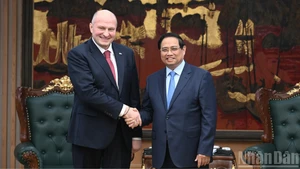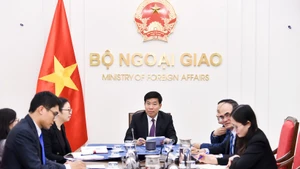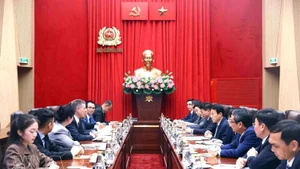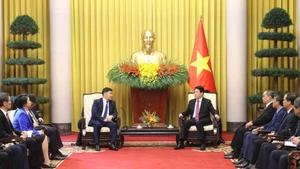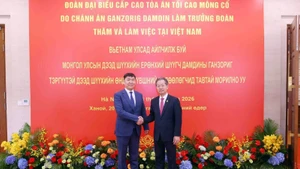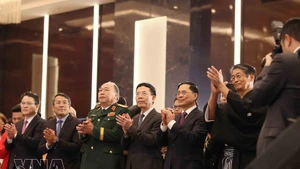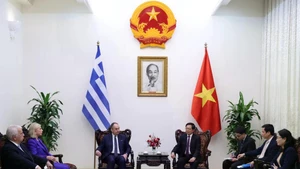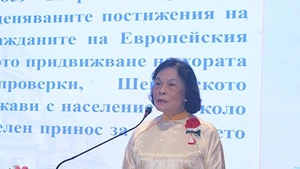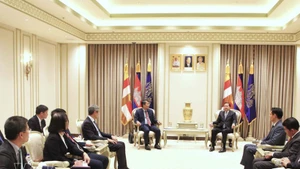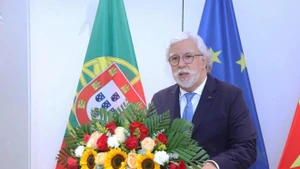From Hanoi, the city of peace, the world witnessed a historic milestone. The signing ceremony of the United Nations Convention against Cybercrime, held on October 25–26, 2025, marked the adoption of a global multilateral treaty on cybercrime — an important step forward in establishing an international legal framework to ensure cybersecurity, justice, and human rights in the digital age.
The Ha Noi Convention was born in the context of mounting global pressure from rapid technological advances and increasingly sophisticated cyber threats. Data breaches, online fraud, ransomware, and cryptocurrency-based money laundering have caused trillions of dollars in damages each year. Cyberspace, once the foundation of development, is now becoming a “new frontline” of non-traditional conflict. Against this backdrop, the UN’s decision to adopt and launch the Ha Noi Convention represents not only a legal breakthrough but also a powerful symbol of global unity and cooperation to safeguard a secure and humane digital environment.
The signing ceremony, held at the National Convention Centre in Ha Noi, attracted over 110 countries, including UN Secretary-General António Guterres and Vietnamese President Luong Cuong, under the theme “Fighting Cybercrime – Sharing Responsibility – Securing Our Common Future.” The event marks the first time a Southeast Asian country has been chosen to host and name a UN global convention — a historic first. By the close of the ceremony, 65 countries had signed the treaty, far exceeding the 40 signatories required for the convention to take effect.

The name “Ha Noi Convention” carries deep symbolic meaning — not only honouring the city of peace but also recognising Viet Nam’s leadership, commitment, and resolve in global cybersecurity governance. Since 2019, Viet Nam has been an active participant in negotiations, contributing practical proposals on technical assistance, technology transfer, and the protection of human rights in cyberspace. The selection of Hanoi as the venue for the opening ceremony is a recognition of a developing nation steadfastly upholding the values of cooperation, rule of law, and sustainable development.
The Ha Noi Convention comprises nine chapters and seventy-one articles, providing a comprehensive framework covering the criminalisation of cyber offences, jurisdiction, international cooperation, extradition, mutual legal assistance, and data protection. The document not only standardises the definition of cybercrime but also establishes cross-border coordination mechanisms, enabling countries to share information, trace, and prosecute offenders more effectively. Acts such as unauthorised access, data theft, online fraud, attacks on critical infrastructure, the use of cyberspace for terrorist propaganda, and cryptocurrency-based money laundering are all clearly defined. This represents a breakthrough in closing long-standing “legal grey zones” that have hampered the prosecution of transnational cyberattacks.
A key feature of the Ha Noi Convention is its balance between security and human rights. While the Budapest Convention (2001), the first international treaty on cybercrime, was criticised for insufficient privacy safeguards and its Eurocentric scope, the Ha Noi Convention remedies this by requiring all investigative and data collection measures to adhere to principles of legality, proportionality, and transparency. Authorities may access personal data or conduct surveillance only with lawful judicial authorisation and within necessary limits. This embodies a humane approach, recognising that cybersecurity cannot be separated from human rights, and reinforces confidence in international rule of law.
From a legal standpoint, the Ha Noi Convention can be seen as the world’s first comprehensive legal framework on cybercrime, requiring member states to incorporate its provisions into national legislation to ensure compatibility and coherence. Once in force, the convention will move into its implementation phase, involving amendments to criminal laws, the establishment of extradition procedures, and mutual legal assistance mechanisms. The United Nations Office on Drugs and Crime (UNODC) will play a central role in monitoring, providing technical assistance, training, and technology transfer to help countries, particularly developing ones, strengthen their enforcement capacity.

For Viet Nam, the Ha Noi Convention presents a major opportunity to enhance its legal framework on cybersecurity, data protection, and high-tech crime prevention. The Ministry of Public Security and relevant agencies have begun formulating implementation plans, establishing an inter-sectoral working group to review, harmonise, and incorporate the convention’s provisions while preparing the necessary technical and human resources. Success in hosting the event also positions Vietnam as a regional cooperation hub for cybersecurity under UNODC coordination for the 2026–2030 period.
The Ha Noi Convention also embodies the vision of multilateralism and the spirit of equal cooperation among nations. At a time when the world is divided by competing technological standards among major powers, the gathering of over sixty countries in Ha Noi to sign a common convention stands as a powerful testament to faith in dialogue and international law. Hanoi has thus become a symbol of digital cooperation — a place where nations come together to share responsibility for safeguarding our collective digital future.
Beyond its legal significance, the Ha Noi Convention carries profound humanitarian value. It affirms that technology must serve humanity, not harm it. By incorporating provisions to protect victims of cybercrime, the convention adopts a people-centred approach, encouraging nations to share technologies, train personnel, and strengthen capacities in less developed countries. In doing so, it helps narrow the digital divide and ensures that no one is left behind in the digital transformation era.
Viet Nam’s role in this process extends beyond that of a host — it is also that of a catalyst. The country has actively fostered dialogue among different blocs, contributed to drafting provisions on technical assistance and data protection, and promoted the balance between development and security. With a proactive and responsible spirit, Vietnam has once again affirmed its position as a reliable partner and a bridge between developed and developing nations in shaping a global digital order.
At the signing ceremony, UN Secretary-General António Guterres remarked: “The Hanoi Convention stands as proof of borderless cooperation, demonstrating that when nations unite for a common cause, for peace and digital security, the world can overcome any divide.” Meanwhile, President Luong Cuong affirmed: “Viet Nam is proud to contribute to global efforts to secure cyberspace, for people and for sustainable development.”
In the long term, the Ha Noi Convention is expected to define a new legal order for global cyberspace, one where international law serves as a “shield” protecting peace and justice in the digital world. From Ha Noi, a message resonates across continents: cybersecurity must go hand in hand with human rights, and international cooperation is the key to ensuring a safe, equitable, and humane digital future. The Hanoi Convention stands as a symbol of global trust, rooted in Viet Nam, a nation of peace and responsibility.
The successful organisation of the Opening Ceremony and High-level Conference of the United Nations Convention against Cybercrime (Ha Noi Convention) owes much to the dedicated partnership of sponsors including VietinBank, PVN, EVN, MB Bank, Agribank, SSI, FPT, VPBank, Gelex, Vietnam Airlines, VIX, BIDV, Viettel, and OKX. Their collaboration reflects the spirit of public-private partnership in an international event of global stature and demonstrates the Vietnamese business community’s sense of social responsibility in fostering a safe, trustworthy, and sustainable digital environment. Thanks to this collective effort, the Ha Noi Convention has become a model of global cooperation, further strengthening Viet Nam’s prestige and standing on the international stage.

